最新初中英语句型转换
中考英语句型转换
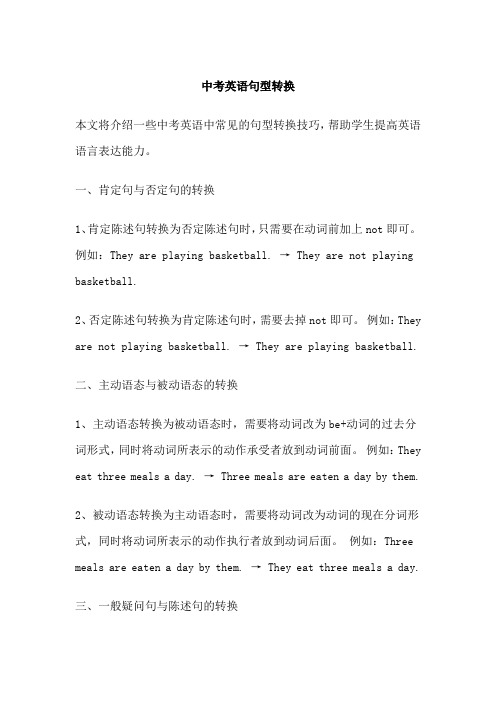
中考英语句型转换本文将介绍一些中考英语中常见的句型转换技巧,帮助学生提高英语语言表达能力。
一、肯定句与否定句的转换1、肯定陈述句转换为否定陈述句时,只需要在动词前加上not即可。
例如:They are playing basketball. → They are not playing basketball.2、否定陈述句转换为肯定陈述句时,需要去掉not即可。
例如:They are not playing basketball. → They are playing basketball.二、主动语态与被动语态的转换1、主动语态转换为被动语态时,需要将动词改为be+动词的过去分词形式,同时将动词所表示的动作承受者放到动词前面。
例如:They eat three meals a day. → Three meals are eaten a day by them.2、被动语态转换为主动语态时,需要将动词改为动词的现在分词形式,同时将动词所表示的动作执行者放到动词后面。
例如:Three meals are eaten a day by them. → They eat three meals a day.三、一般疑问句与陈述句的转换1、一般疑问句转换为陈述句时,需要将动词改为相应的陈述语气,同时将主语放到动词后面。
例如:Are they playing basketball? →They are playing basketball.2、陈述句转换为一般疑问句时,需要将动词改为一般疑问语气,同时将主语放到动词前面。
例如:They are playing basketball. →Are they playing basketball?四、时间状语从句的转换1、现在时态的时间状语从句转换为过去时态的时间状语从句时,需要将动词改为过去时态。
例如:I will go to the park tomorrow. → I went to the park yesterday.2、过去时态的时间状语从句转换为现在时态的时间状语从句时,需要将动词改为现在时态。
最新初中英语句型转换(附答案)

初中英语句型转换(附答案)句型转换1.Why don’t you ask your teacher for help when you are in trouble?(改为同义句)______ _______ask your teacher for help when you are in trouble?2.I used to get up early in the morning.(改为一般疑问句)______you ________to get up early in the morning?3.If you work hard, you’ll catch up with your classmates.(改为祈使句)_________ ________, and you’ll catch up with your classmates.4.I think we should stay at home to do our homework tonight.(改为否定句)I _______ _________ we should stay at home to do our homework tonight.5.The Japanese girl can hardly sing a Chinese song.(改为反意疑问句)The Japanese girl can hardly sing a Chinese song, ________ _________?6.The teacher allowed the students to go to see the movie.(改为被动语态)The students________ _________ to go to see the movie.7.My boss has been to Hong Kong twice a month.(对划线部分提问)_________ ________ has your boss been to Hong Kong?8.We study English very hard.(改为感叹句)_______ _________we study English!9.Does Jenny like dancing? Can you tell me?(合并成含有宾语从句的复合句) Can you tell me ________Jenny_________ dancing?10.The girl with some flowers in her hand is my sister.(改写成含有定语从句的复合句)The girl ________ ________some flowers in her hand is my sister.11.There are some books on the desk.(改为否定句)There _________ _________ books on the desk.12.He doesn’t know what he should do.(改为简单句)He doesn’t know________ _________do.13.I spend an hour in reading English every day.(改为同义句)It _________ me an hour ________read English every day.14.Let’s play together.(改为反意疑问句)Let’s play together, ___________ __________?15. “Where are you going to spend your holiday?” he asked her.(改为复合句)He asked her __________ she _________ going to spend her holiday.16.Tony studies maths very hard in our class.(改为感叹句)_________ __________ Tony studies maths in our class!17.He is good at physics, and he can work out the difficult exercise.(改为同义句) He ___________ __________ in physics, and he can work out the difficult exercise.18.There is little milk in the bottle.(改为反意疑问句)There is little milk in the bottle, __________ __________?19.We can hear the girls singing in the next room.(改为被动语态)The girls can __________ ___________singing in the next room.20.Lucy will finish writing an e-mail in half an hour.(对划线部分提问)__________ _________ will Lucy finish writing an e-mail?21.There are some oranges in the basket.(改为一般疑问句)________ there __________ oranges in the basket?22.The boy is too young to go to school.(同义句)The boy is _________ young _________ he can’t go to school.23.Let’s go to the zoo.(反意疑问句)Let’s go to the zoo, _________ _________?24.I don’t know what I should do.(改为简单句)I don’t know what __________ ___________.25.I think Mr. Zhang is ill in hospital.(否定句)I _________ think Mr. Zhang _________ill in hospital.26.He has never been to Beijing.(反意疑问句)He has never been to Beijing, __________ _________.27.They are very excited.(感叹句)_________ _________ they are!28.We planted a lot of trees in the village last year.(改为被动语态)A lot of trees __________ __________ in the village last year.29.I’ve been learning English since 2003.(对划线部分提问)__________ _________ have you been learning English?30.I don’t like coffee. He doesn’t like coffee, either.(合并为一句)__________ I _________ he likes coffee.31.She is a woman teacher. (改为复数形式)They are ___________ _________.32.The twin needs some bananas.(改为否定句)The twin ___________ need _________bananas.33.You mustn’t throw anything at the animals when you are in the zoo.(改为祈使句)_________ __________ anything at the animals when you are in the zoo.34.The Changjiang River is the longest river of China.(用Yellow River改为选择疑问句)_________is the longest river of China, the Changjiang River _________the Yellow River?35.I don’t think you can finish it on time.(改为反意疑问句)I don’t think he can finish it on time, ____________ ___________?36.The river is 10 meters wide.(对划线部分提问)__________ ___________ is the river.37.Not only Tom but also Bob has been to that island.(改为同义句)_________ Tom and Bob _________ been to that island.38.I sent a letter to you last month.(改为被动语态)A letter __________ _________ to you last month.39.Your living-room is very bright.(改为感叹句)__________ _________ your living-room is!40.Does the earth go around the sun? My son asked the teacher.(合并为宾语从句) My son asked the teacher _________ the earth __________ around the sun.41.We had a great time yesterday.(改为感叹句)_________ _________ great time we had yesterday!42.The book cost me five yuan.(改为同义句)I _________ five yuan _________ the book.43.The problem is so hard. I can’t work it out.(合并为简单句)The problem is __________hard for me ___________work out.答案:1.Why not 2.Did, you 3.Work; hard 4.don’t think 5.can she 6.were allowed 7.How often 8.How hard 9.if/wether ;likes 10.who/that, has/holds 11.aren’t any 12.what, to 13.takes; to 14.shall we 15.where; was 16.How hard 17.does well 18.is there 19.be heard 20.How soon 21.Are; any 22.so; that 23.shall we 24.to do25.don’t is 26.has he 27.How excited 28.were planted 29.How long 30.Neither nor 31.women teachers 32.doesn’t any 33.Don’t throw 34.Which or 35.can he 36.How wide 37.Both have 38.was sent 39.How bright 40.if/whether went 41.What a 42.spent on 43.too to。
初中英语句型转换方法归纳
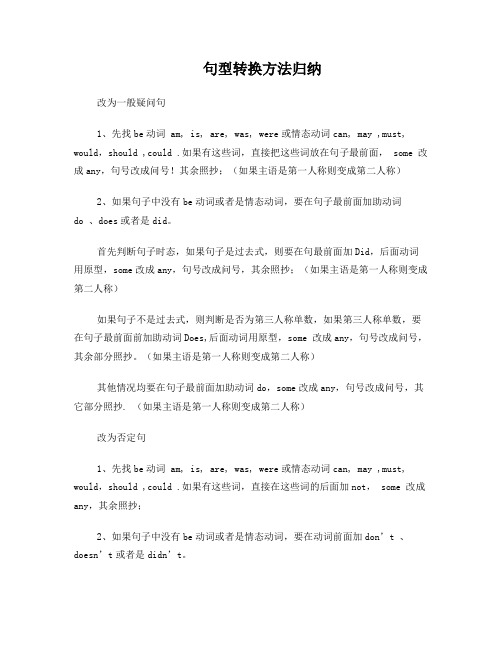
句型转换方法归纳改为一般疑问句1、先找be动词 am, is, are, was, were或情态动词can, may ,must, would,should ,could .如果有这些词,直接把这些词放在句子最前面, some 改成any,句号改成问号!其余照抄;(如果主语是第一人称则变成第二人称)2、如果句子中没有be动词或者是情态动词,要在句子最前面加助动词do 、does或者是did。
首先判断句子时态,如果句子是过去式,则要在句最前面加Did,后面动词用原型,some改成any,句号改成问号,其余照抄;(如果主语是第一人称则变成第二人称)如果句子不是过去式,则判断是否为第三人称单数,如果第三人称单数,要在句子最前面前加助动词Does,后面动词用原型,some 改成any,句号改成问号,其余部分照抄。
(如果主语是第一人称则变成第二人称)其他情况均要在句子最前面加助动词do,some改成any,句号改成问号,其它部分照抄. (如果主语是第一人称则变成第二人称)改为否定句1、先找be动词 am, is, are, was, were或情态动词can, may ,must, would,should ,could .如果有这些词,直接在这些词的后面加not, some 改成any,其余照抄;2、如果句子中没有be动词或者是情态动词,要在动词前面加don’t 、doesn’t或者是didn’t。
首先判断句子时态,如果句子是过去式,则要在动词前面加didn’t,后面动词用原型,some改成any,其余照抄;如果句子不是过去式,则判断是否为第三人称单数,如果第三人称单数,要在动词前面前加doesn’t,后面动词用原型,some 改成any,其余部分照抄。
其他情况均要在句子动词前面加don’t,some改成any,其它部分照抄.对划线部分提问第一步:先把句子改成一般问句第二步:把提问部分省略,在句子最前面加疑问词。
初中英语知识点归纳常用句型及句式转换

初中英语知识点归纳常用句型及句式转换英语学习中,句型和句式是非常重要的基础知识。
掌握常用的句型和灵活运用句式可以帮助我们更好地理解英语语法和提高语言表达能力。
下面是初中英语中常见的句型和句式转换的归纳总结。
一、肯定句和否定句的转换1. 肯定句:主语 + 动词 + 其他成分否定句:主语 + 助动词 do/does/did + not + 动词 + 其他成分例句:He is a doctor.(肯定句)He is not a doctor.(否定句)2. 肯定句:主语 + am/is/are + 名词/形容词 + 其他成分/地点/时间否定句:主语 + am/is/are + not + 名词/形容词 + 其他成分/地点/时间例句:They are students.(肯定句)They are not students.(否定句)3. 肯定句:主语 + 动词 + 副词/介词短语 + 其他成分否定句:主语 + 助动词 do/does/did + not + 动词 + 副词/介词短语 + 其他成分例句:She speaks English fluently.(肯定句)She does not speak English fluently.(否定句)二、一般疑问句和特殊疑问句的转换1. 一般疑问句:肯定句:Do/Does/Did + 主语 + 动词 + 其他成分?否定句:Do/Does/Did + 主语 + 动词 + not + 其他成分?特殊疑问句:疑问词 + 一般疑问句的语序例句:She goes to school by bus.(一般疑问句)Does she go to school by bus?(特殊疑问句)2. 一般疑问句:肯定句:Am/Is/Are + 主语 + 名词/形容词 + 其他成分/地点/时间?否定句:Am/Is/Are + 主语 + not + 名词/形容词 + 其他成分/地点/时间?特殊疑问句:疑问词 + 一般疑问句的语序例句:They are students.(一般疑问句)Are they students?(特殊疑问句)3. 一般疑问句:肯定句:助动词 + 主语 + 动词 + 副词/介词短语 + 其他成分?否定句:助动词 + Do/Does/Did + 主语 + 动词 + not + 副词/介词短语 + 其他成分?特殊疑问句:疑问词 + 一般疑问句的语序例句:He speaks English fluently.(一般疑问句)Does he speak English fluently?(特殊疑问句)三、陈述句和祈使句的转换1. 陈述句:主语 + 动词 + 其他成分祈使句:动词 + 其他成分(一般省略主语 you)例句:They play football.(陈述句)Play football.(祈使句)2. 陈述句:主语 + am/is/are + 名词/形容词 + 其他成分/地点/时间祈使句:Be + 名词/形容词 + 其他成分/地点/时间例句:You are a student.(陈述句)Be a student.(祈使句)3. 陈述句:主语 + 动词 + 副词/介词短语 + 其他成分祈使句:动词 + 副词/介词短语 + 其他成分例句:She speaks English fluently.(陈述句)Speak English fluently.(祈使句)通过以上的归纳总结,我们可以更好地理解和运用常用的句型和句式转换。
初中英语句型转换类型总结
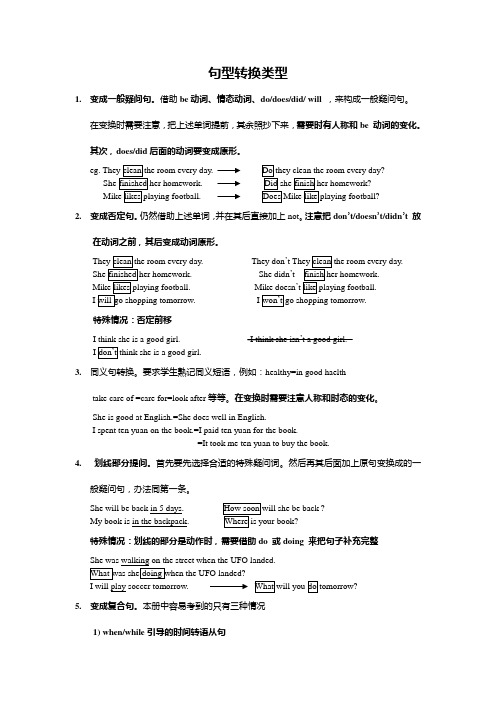
句型转换类型1.变成一般疑问句。
借助be动词、情态动词、do/does/did/ will ,来构成一般疑问句。
在变换时需要注意,把上述单词提前,其余照抄下来,需要时有人称和be 动词的变化。
其次,does/did后面的动词要变成原形。
2.变成否定句。
仍然借助上述单词,并在其后直接加上not。
注意把don’t/doesn’t/didn’t 放在动词之前,其后变成动词原形。
They don’She didn’tMike doesn’特殊情况:否定前移I think she is a good girl. I think she isn’t a good girl.3.同义句转换。
要求学生熟记同义短语,例如:healthy=in good haelthtake care of =care for=look after等等。
在变换时需要注意人称和时态的变化。
She is good at English.=She does well in English.I spent ten yuan on the book.=I paid ten yuan for the book.=It took me ten yuan to buy the book.4.划线部分提问。
首先要先选择合适的特殊疑问词。
然后再其后面加上原句变换成的一般疑问句,办法同第一条。
She will be back in 5 days.My book is in the backpack.特殊情况:划线的部分是动作时,需要借助do 或doing 来把句子补充完整She was walking on the street when the UFO landed.I will play soccer tomorrow.5. 变成复合句。
本册中容易考到的只有三种情况1) when/while引导的时间转语从句She was coolong. Mary came home.2) if 引导的条件状语从句(注意主句、从句使用的时态不同)有or, if 引导的用否定)Work hardIf you work hard, you will pass the exam. (有and, if 引导的用肯定)3)直接引语变成间接引语。
七年级英语句式转换30道

七年级英语句式转换30道1. 陈述句:She is a student. 疑问句:Is she a student? 解析:陈述句中有be 动词is,变为一般疑问句时将is 提到句首,句末用问号。
2. 陈述句:They are in the classroom. 疑问句:Are they in the classroom? 解析:陈述句中有be 动词are,变为一般疑问句时将are 提到句首。
3. 陈述句:I am happy. 疑问句:Am I happy? 解析:陈述句中有be 动词am,变为一般疑问句时将am 提到句首,注意第一人称I 变为第二人称you 时,be 动词要用are。
4. 陈述句:He likes apples. 疑问句:Does he like apples? 解析:陈述句中动词likes 是第三人称单数形式,变为一般疑问句时要借助助动词does,likes 变回原形like。
5. 陈述句:We play football on Sundays. 疑问句:Do we play football on Sundays? 解析:陈述句中动词play 是原形,变为一般疑问句时借助助动词do。
6. 陈述句:The dog runs fast. 疑问句:Does the dog run fast? 解析:陈述句中动词runs 是第三人称单数形式,变为一般疑问句时借助助动词does,runs 变回原形run。
7. 陈述句:My father works hard. 疑问句:Does my father work hard? 解析:陈述句中动词works 是第三人称单数形式,变为一般疑问句时借助助动词does,works 变回原形work。
8. 陈述句:She has a pen. 疑问句:Does she have a pen? 解析:陈述句中has 是have 的第三人称单数形式,变为一般疑问句时借助助动词does,has 变回原形have。
中考英语丨初中英语句型转换大全

中考英语丨初中英语句型转换大全展开全文一、陈述句与疑问句、祈使句、感叹句间的转换1、陈述句中肯定句变为否定句,大部分是用not来改变谓语结构,但也有借用否定意义的词,如nothing, nobody, none, neither, little, few, never, hardly等,例如:A:T om does well in maths.B:Tom doesn't do in maths.A:He has much to do.B:He has nothing to do.A:All of my classmates like art.B:None of my classmates likes art.2、改为疑问句。
根据上下句的结构和词的减少,来判断变为哪一种形式的疑问句。
例如:A:My brother often has breakfast at school.B: Does your brother often have breakfast at school?A:T om's already weak in English.B:Tom's already weak in English, isn't he ?A:The red light changes every two minutes.B:How often does the red light change?3、改为感叹句。
根据所给的句子结构和单词的词性,来确定使用哪一种感叹句的形式,例如:A:This is an interesting book.B:What an interesting book this is!或 How interesting this book is!二、同义句转换。
根据上句,写出一个意思相同(或相近)的下句,此类形式繁多,内容复杂,涉及面广,归类如下:1、同义词或词组之间的转换。
初中英语句型转换(陈述句变一般疑问句特殊疑问句及练习)

初中英语句型转换(陈述句变一般疑问句特殊疑问句及练习) 初中英语句型转换一、 肯定句改的方法——一步法1. 有 be 动词(is are am were was)/情态动词(can,could, will, would, shall, should,must,may)的。
在 be 动词/情态动词后后加 not。
2. 无 be 动词/情态动词,一般现在时在动词前加 don’t 第三人称单数前 doesn't/一般过去式 didn’t。
3 加 doesn't/ did n’t 的句子注意,句子动词要变成原型。
二、 肯定句改一般疑问句的方法——三步法1. 有 be 动词/情态动词:be 动词/情态动词提到句首,其余照抄,句末用问号。
2. 无 be 动词/情态动词,在句首加 Do/Does/Did,其余照抄,句末用问号。
注意(some 改成 any,第一人称变为第二人称 my 改成 your , I 改成 you,we 改成 you,our 改成 your )3. 加 Does、did 的句子注意,句子动词要变成原型。
例如 陈述句: They are in the park.He can play the guitar.He likes the dogs.否定句 They are not in the park. He can not play the guitar. He doesn't like the dogs一般疑问句: Are they in the park?Can he play the guitar?Does he like the dogs?特殊疑问词的用法whowhom what whichwhose what color What time when where why意思 谁 谁什么 哪一个谁的 什么颜色用法 问人的身份,姓 名等 问人的身份,姓 名等(问宾语) 问人的职业或 事物是什么 问一定范围内 特指的人或物问所属关系问颜色(表语)例句He is LiLieWho is he ?He is my brother. Who is he ?I can ask him the question.Whom can you ask the question?He is a worker. What is he?He has a book. What does he have ?The big box is mine. Which box is yours?The girl at the door is Ann. Which girl is Ann?This is her book. Whose book is this ? This book is hers. Whose is this book?My skirt is red. What color is your skirt?几点 什么时候 什么地方 为什么问点时间 问时间 问地点(状语) 问原因We play games at five in the afternoon ? What time do you play games? We play games in the afternoon ? When do you play games? We play games at home on Sunday ? Where do you play games on Sunday? He isn't at school today because he is ill.1/6初中英语句型转换(陈述句变一般疑问句特殊疑问句及练习)Why isn't he at school today ?how怎样问健康状况、 He is fine/strong. How is he ?做事的方式等 I go home by bike. How do you gohome?how old 多大几岁 问年龄He is ten. How old is he ?how many多少跟复数名词, 问数量There are thirty boys in my class. How many boys are there in your class?how much多少跟不可数名词 问数量或价钱There is some milk in the bottle. How much milk is there in the bottle?how far 多远问路程It's five kilometers away from here?How far is it from here?how soon 多久问 in+一段时间 He can finish it in half an hour.How soon can he finish it ?how long 多久问一段时间, 问物体的长短He has lived here for a year. How long has he lived here?The desk is one meters long.How long is the desk ?how often 多久问频率I go to see my parents once a month.(一次)How often do you go to see your parents?How 的疑问句辨析一、how many 和 how much 的区别 how many 用来询问可数名词的数量,它的句式是:How many+复数名词+一般疑问句+?how much 用来询问不可数名词的数量,也可询问价格。
初中英语句型转换题
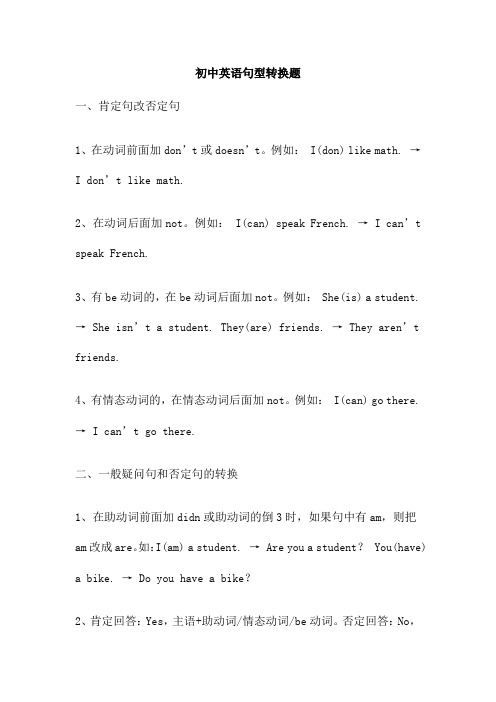
初中英语句型转换题一、肯定句改否定句1、在动词前面加don’t或doesn’t。
例如: I(don) like math. →I don’t like math.2、在动词后面加not。
例如: I(can) speak French. → I can’t speak French.3、有be动词的,在be动词后面加not。
例如: She(is) a student. → She isn’t a student. They(are) friends. → They aren’t friends.4、有情态动词的,在情态动词后面加not。
例如: I(can) go there. → I can’t go there.二、一般疑问句和否定句的转换1、在助动词前面加didn或助动词的倒3时,如果句中有am,则把am改成are。
如:I(am) a student. → Are you a student? You(have)a bike. → Do you have a bike?2、肯定回答:Yes,主语+助动词/情态动词/be动词。
否定回答:No,主语+助动词/情态动词/be动词 not。
如:—Are you a student?—Yes,I am./No,I am not.3、在情态动词或助动词前面加didn或助动词的倒3时,如果句中有was,则把was改成were。
如:He(was) here an hour ago. → Were you here an hour ago?4、就一般疑问句提问。
如:He(is) a doctor. → Is he a doctor?They(have) a car. → Do they have a car? We(will) go to school tomorrow. → Will we go to school tomorrow? They(can) swim. → Can they swim?5、就否定句提问。
七年级英语句型转换题

七年级英语句型转换题英语句型转换是提高语言运用能力和理解能力的重要训练方法之一。
在七年级的英语学习中,句型转换可以帮助学生更好地掌握英语语法规则,提高句子的表达能力,增加对不同语言结构的理解。
下面将详细介绍一些七年级英语句型转换题。
一、陈述句与一般疑问句转换1. 陈述句:He is a student.一般疑问句:Is he a student?2. 陈述句:She plays tennis every Sunday.一般疑问句:Does she play tennis every Sunday?3. 陈述句:They have lunch at 12:00.一般疑问句:Do they have lunch at 12:00?4. 陈述句:We live in London.一般疑问句:Do we live in London?5. 陈述句:You like chocolate ice cream.一般疑问句:Do you like chocolate ice cream?二、一般疑问句与陈述句转换1. 一般疑问句:Can she swim?陈述句:She can swim.2. 一般疑问句:Have they been to Beijing?陈述句:They have been to Beijing.3. 一般疑问句:Is it raining?陈述句:It is raining.4. 一般疑问句:Did he watch TV last night?陈述句:He watched TV last night.5. 一般疑问句:Do you like pizza?陈述句:You like pizza.三、陈述句与否定句转换1. 陈述句:She is a doctor.否定句:She is not a doctor.2. 陈述句:I can swim.否定句:I cannot swim.3. 陈述句:We visit our grandparents every summer.否定句:We do not visit our grandparents every summer.4. 陈述句:He likes playing basketball.否定句:He does not like playing basketball.5. 陈述句:They have finished their homework.否定句:They have not finished their homework.四、特殊疑问句与陈述句转换1. 特殊疑问句:What is your name?陈述句:My name is Tom.2. 特殊疑问句:When did you wake up this morning?陈述句:I woke up this morning.3. 特殊疑问句:Where is the nearest supermarket?陈述句:The nearest supermarket is here.4. 特殊疑问句:How many students are there in your class?陈述句:There are 30 students in my class.5. 特殊疑问句:Why did you go to the park yesterday?陈述句:I went to the park yesterday for a picnic.通过以上的例题,可以看出七年级英语句型转换题主要包括陈述句与一般疑问句的转换、一般疑问句与陈述句的转换、陈述句与否定句的转换以及特殊疑问句与陈述句的转换等。
八年级英语句型转换20题
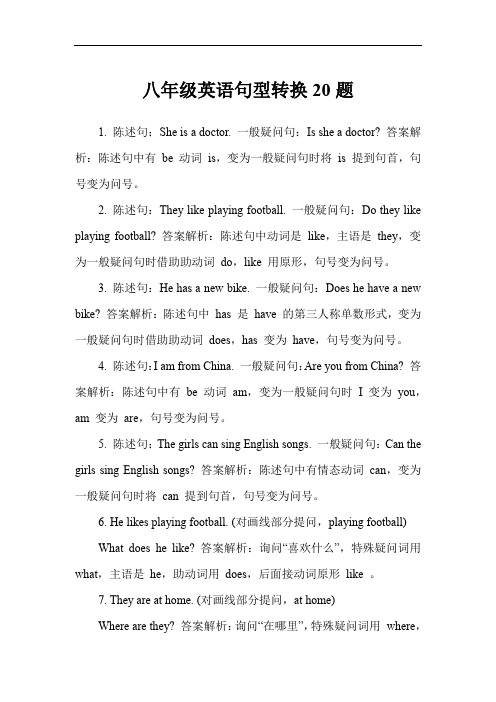
八年级英语句型转换20题1. 陈述句:She is a doctor. 一般疑问句:Is she a doctor? 答案解析:陈述句中有be 动词is,变为一般疑问句时将is 提到句首,句号变为问号。
2. 陈述句:They like playing football. 一般疑问句:Do they like playing football? 答案解析:陈述句中动词是like,主语是they,变为一般疑问句时借助助动词do,like 用原形,句号变为问号。
3. 陈述句:He has a new bike. 一般疑问句:Does he have a new bike? 答案解析:陈述句中has 是have 的第三人称单数形式,变为一般疑问句时借助助动词does,has 变为have,句号变为问号。
4. 陈述句:I am from China. 一般疑问句:Are you from China? 答案解析:陈述句中有be 动词am,变为一般疑问句时I 变为you,am 变为are,句号变为问号。
5. 陈述句:The girls can sing English songs. 一般疑问句:Can the girls sing English songs? 答案解析:陈述句中有情态动词can,变为一般疑问句时将can 提到句首,句号变为问号。
6. He likes playing football. (对画线部分提问,playing football)What does he like? 答案解析:询问“喜欢什么”,特殊疑问词用what,主语是he,助动词用does,后面接动词原形like 。
7. They are at home. (对画线部分提问,at home)Where are they? 答案解析:询问“在哪里”,特殊疑问词用where,主语是they,be 动词用are 。
8. She goes to school by bike. (对画线部分提问,by bike)How does she go to school? 答案解析:询问“出行方式”,特殊疑问词用how,主语是she,助动词用does,后面接动词原形go 。
初二英语句式转换50题
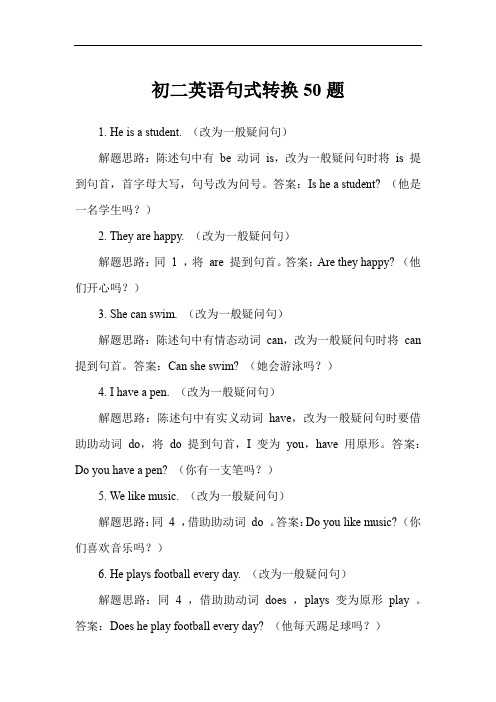
初二英语句式转换50题1. He is a student. (改为一般疑问句)解题思路:陈述句中有be 动词is,改为一般疑问句时将is 提到句首,首字母大写,句号改为问号。
答案:Is he a student? (他是一名学生吗?)2. They are happy. (改为一般疑问句)解题思路:同1 ,将are 提到句首。
答案:Are they happy? (他们开心吗?)3. She can swim. (改为一般疑问句)解题思路:陈述句中有情态动词can,改为一般疑问句时将can 提到句首。
答案:Can she swim? (她会游泳吗?)4. I have a pen. (改为一般疑问句)解题思路:陈述句中有实义动词have,改为一般疑问句时要借助助动词do,将do 提到句首,I 变为you,have 用原形。
答案:Do you have a pen? (你有一支笔吗?)5. We like music. (改为一般疑问句)解题思路:同4 ,借助助动词do 。
答案:Do you like music? (你们喜欢音乐吗?)6. He plays football every day. (改为一般疑问句)解题思路:同 4 ,借助助动词does ,plays 变为原形play 。
答案:Does he play football every day? (他每天踢足球吗?)7. They watch TV in the evening. (改为一般疑问句)解题思路:同6 ,借助助动词do ,watch 用原形。
答案:Do they watch TV in the evening? (他们晚上看电视吗?)8. She has breakfast at seven. (改为一般疑问句)解题思路:同 6 ,借助助动词does ,has 变为have 。
答案:Does she have breakfast at seven? (她七点吃早餐吗?)9. The boy likes apples. (改为一般疑问句)解题思路:同6 ,借助助动词does ,likes 变为like 。
初中英语知识点归纳多种句型的转换与运用

初中英语知识点归纳多种句型的转换与运用英语知识点归纳:多种句型的转换与运用在初中英语学习中,句型的转换与运用是一个重要的知识点。
通过灵活地使用不同的句型,可以丰富表达,提高语言表达的准确性和流畅度。
本文将介绍几种常见的英语句型转换与运用,并通过例句进行说明。
一、主动语态与被动语态的转换1. 被动语态转换为主动语态被动语态句子的主语通常是动作的承受者,而主动语态句子的主语则是动作的执行者。
将被动语态转换为主动语态时,需注意时态和主谓一致。
例如:被动语态:The cake was baked by Mary.(这个蛋糕是玛丽烤的。
)主动语态:Mary baked the cake.(玛丽烤了这个蛋糕。
)2. 主动语态转换为被动语态主动语态句子的主语是动作的执行者,而被动语态句子的主语是动作的承受者。
将主动语态转换为被动语态时,需注意时态和被动语态的结构。
例如:主动语态:Tom writes a letter.(汤姆写一封信。
)被动语态:A letter is written by Tom.(一封信被汤姆写了。
)二、特殊疑问句与陈述句、祈使句的转换1. 陈述句转换为特殊疑问句在将陈述句转换为特殊疑问句时,需将句子结构调整,并使用适当的疑问词。
例如:陈述句:Lucy is reading a book.(露西在读一本书。
)特殊疑问句:What is Lucy doing?(露西在做什么?)2. 祈使句转换为特殊疑问句将祈使句转换为特殊疑问句时,需在原句的基础上加上疑问词以呈现疑问语气。
例如:祈使句:Open the window.(打开窗户。
)特殊疑问句:Can/Could you open the window, please?(请你打开窗户,好吗?)三、直接引语与间接引语的转换1. 直接引语转换为间接引语将直接引语转换为间接引语时,需要变换人称、动词形式和引号的使用。
例如:直接引语:She said, "I will go to the park tomorrow."(她说:“我明天会去公园。
初中英语2024届中考复习句型转换专项练习(共100题,附参考答案和解析)
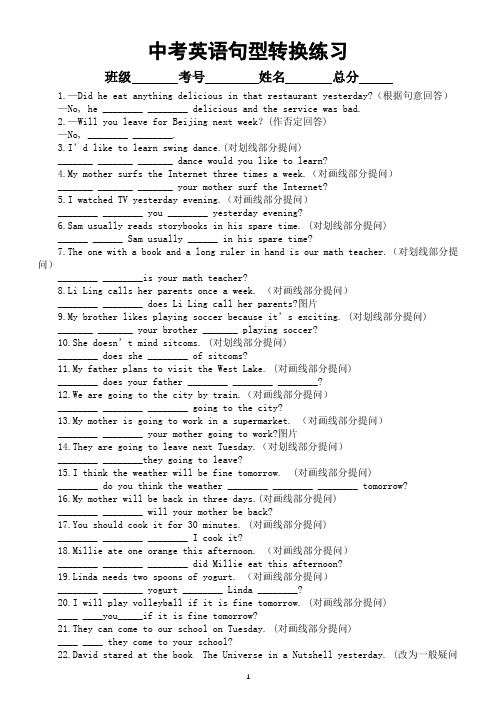
中考英语句型转换练习班级考号姓名总分1.—Did he eat anything delicious in that restaurant yesterday?(根据句意回答)—No, he ________ ________ delicious and the service was bad.2.—Will you leave for Beijing next week?(作否定回答)—No, ________ ________.3.I’d like to learn swing dance.(对划线部分提问)_______ _______ _______ dance would you like to learn?4.My mother surfs the Internet three times a week.(对画线部分提问)_______ _______ _______ your mother surf the Internet?5.I watched TV yesterday evening.(对画线部分提问)________ ________ you ________ yesterday evening?6.Sam usually reads storybooks in his spare time. (对划线部分提问)______ ______ Sam usually ______ in his spare time?7.The one with a book and a long ruler in hand is our math teacher.(对划线部分提问)________ ________is your math teacher?8.Li Ling calls her parents once a week. (对画线部分提问)________ ________ does Li Ling call her parents?图片9.My brother likes playing soccer because it’s exciting. (对划线部分提问)_______ _______ your brother _______ playing soccer?10.She doesn’t mind sitcoms. (对划线部分提问)________ does she ________ of sitcoms?11.My father plans to visit the West Lake. (对画线部分提问)________ does your father ________ ________ ________?12.We are going to the city by train.(对画线部分提问)________ ________ ________ going to the city?13.My mother is going to work in a supermarket. (对画线部分提问)________ ________ your mother going to work?图片14.They are going to leave next Tuesday.(对划线部分提问)________ ________they going to leave?15.I think the weather will be fine tomorrow. (对画线部分提问)________ do you think the weather ________ ________ ________ tomorrow?16.My mother will be back in three days.(对画线部分提问)________ ________ will your mother be back?17.You should cook it for 30 minutes. (对画线部分提问)________ ________ ________ I cook it?lie ate one orange this afternoon. (对画线部分提问)________ ________ ________ did Millie eat this afternoon?19.Linda needs two spoons of yogurt. (对画线部分提问)________ ________ yogurt ________ Linda ________?20.I will play volleyball if it is fine tomorrow. (对画线部分提问)____ ____you_____if it is fine tomorrow?21.They can come to our school on Tuesday. (对画线部分提问)____ ____ they come to your school?22.David stared at the book The Universe in a Nutshell yesterday. (改为一般疑问句)_________ David _________ at the book The Universe in a Nutshell yesterday?23.The teacher told us just now. The sun is bigger than the earth.(改为含宾语从句的复合句)The teacher ________ us just now that the sun ________ bigger than the earth.24.Li Ming is playing basketball now.(用often改写句子)Li Ming_______ _______basketball.25.They bought something special in the supermarket.(改为一般疑问句)________ they________ ________ special in the supermarket?26.James Harden seldom argues with his classmates.(改为反意疑问句)James Harden seldom argues with his classmates, __________ __________?27.She stayed there for a week.(改为否定句)She ________ ________ there for a week.28.He plays soccer and goes swimming on weekends.(改为否定句)He ______ ________ soccer ________ ________ swimming on weekends.29.Huang Lei likes sports , and Larry likes sports , too.(合并为一句)________ Huang Lei ________ Larry like sports .30.I like the city better than the country.(改为选择疑问句)__________ do you like __________, the city or the country?31.I think my dress is the same as Rita’s. (改为反义句)I think my dress is ________ ________ Rita’s.32.I have something to tell you. (改为一般疑问句)________ you have ________ to tell me?33.Your sister sent me a message on the mobile phone. (改为否定句)Your sister ________ ________ a message to me on the mobile phone.34.We visited the Palace Museum last weekend. (用next Sunday改写句子)We are ________ to ________ the Palace Museum next Sunday.35.I am going to make some dumplings tomorrow morning. (改为一般疑问句)________ you going to make ________ dumplings tomorrow morning?36.The work will be finished in two hours.(改为—般疑问句)________the work ________ ________ in two hours?37.Do you know? Will we hold an English party this term? (改为含宾语从句的复合句)Do you know ________ we ________ an English party this term?38.The Greens will go to Hainan Island for a vacation.(改为一般疑问句)________ ________ ________ ________ to Hainan Island for a vacation?39.I think there will be more pollution.(改为否定句)I ________ think there ________ be more pollution.40.The students of Class 2 will see the animals at the zoo this Sunday afternoon.(改为否定句)The students of Class 2________ ________ the animals at the zoo this Sunday afternoon.41.Will you please come here on time? (改祈使句)________ ______ on time, please.42.Bill put some fruit in the fridge just now. (改为否定句)Bill ________ ________ any fruit in the fridge just now.43.The food is very delicious. (改为感叹句)________ ________ the food is!44.You mustn’t smoke here. (改为祈使句)________ ________ here, please.45.Pour some water into the glass. (改为否定句)________ ________ ________ water into the glass.46.Put the bananas and the milk in the blender. (改为否定句)________ put the bananas ________ in the blender.47.The doctor often adivses us that we should be active in sports.(改为祈使句)“_______ _______ in sports.” the doctor often says to us.48.They are going to do more practice. They will win the match. (改为含有if条件句的复合句)______ they ______ more practice, they______ ______ the match.49.If you study hard, you’ll catch up with others. (改为并列句)____ ____, or you’ll fall behind others.50.Jane has to do her homework first.(改为否定句)Jane ________ ________ to do her homework first.51.Alice studied for a math test last night. (改为否定句)Alice ________ ________ for a math test last night.52.I can go to the zoo with you after lunch.(改为一般疑问句)________ ________ ________ to the zoo with me after lunch?53.Does Zhang Juan have to go to school now? (改为陈述句)Zhang Juan ____ ____ go to school now.54.They will go to Beijing on vacation next week. They will have enough time.(合并为含if的复合句)They will go to Beijing on vacation next week ________ they ________ enough time.55.If you wear jeans, we won’t let you in.(改为祈使句)________ ________ ________, or we won’t let you in.56.She will go to the cinema. It won’t snow tomorrow.(用if合并为一句)She ____ ____ to the cinema if it ____ ____ tomorrow.57.He asked me to go to Hefei with him. (改为否定句)He asked me ________ ________ ________ to Hefei with him.58.Please bring some masks to my house. (改为否定句)________ ________ any masks to my house please.59.The Muji(无印良品) pen cost me 99 yuan. (保持原句意思不变)I __________ 99 yuan __________ the Muji(无印良品) pen.60.Why don’ t you tell him the news?(改为同义句)________ ________ tell him the news?61.Dean didn't t say anything at the meeting.(改为同义句)Dean________ ________ at the meeting.62.To lie on the beach is relaxing. (变为同义句)______ ___________ to lie on the beach .63.Town Cinema is cheaper than any other cinema in our town .(变为同义句)Town Cinema is______ ___________ in our town .图片64.What do you think of the 2018 Spring Festival Gala?(变为同义句)______ do you ______ the 2018 Spring Festival Gala?65.It is about 15 minutes’walk from here to school.(变为同义句)It is about 15 ______ ______ ______ from here to school.66.This book is not as interesting as that one. (保持句意基本不变)This book is _______ interesting _______ that one.67.The baby sleeps over ten hours a day. (改为同义句)The baby sleeps ______ ______ ten hours a day.68.English isn’t as easy as history.(改为同义句)English is ___________ ___________ ________ history.69.They both study very hard.(改为同义句)__________ __________ them study very hard.70.Lily sings better than Lucy. (改为同义句)Lucy ____________ sing ____________ well as Lily.71.I’m 13 years old, and she is 13 years old, too.(改为同义句)We ________ ________ 13 years old.72.Jim is 13 and Mike is 17. (改为同义句)Mike is 4 years ________ ________ Jim.73.Lin Hui asked me, “Do you help your parents with the housework?”(改为同义句)Lin Hui asked me ____I ____ my parents with the housework.74.Miss Li is popular in our class. Mr. Wang is more popular. (同义句转换)Mr. Wang is __________ popular __________ Miss Li.75.My painting isn’t as beautiful as Millie’s. (改为同义句)My painting is ________ ________ than Millie’s.76.This hotel’s service is friendlier than any other Hotel in town. (改为同义句)This hotel’s service is ________ ________ in town.77.Tina works harder than any other student in her class. (改为同义句)Tina ________ ________ in her class.78.Tom is the most popular student in our class. (改为同义句)Tom is ________ popular ________ any other student in our class.79.Shanghai is the biggest city in China. (改为同义句)Shanghai is bigger ________ ________ other city in China.80.My favorite song is My Dream.(改为同义句)I ____ the song My Dream ____.81.Mike hopes he can visit the Great Wall one day. (同义句转换)Mike hopes ________ ________ the Great Wall one day.82.They decided to go to Australia for their holiday. (改为同义句)They decided ________ _________ _________ a holiday _________ Australia.83.I went to the forest alone because I didn’t want others to know it. (改为同义句)I went to the forest alone because I wanted to ________ ________ _________.84.What do you think of action movies?(改为同义句)________________ ________________ ________________ ________________ action movies?85.I hope to find a good job some day. (改为同义句)I ________________ that ________________ ________________ ________________ a good job some day.86.They may not be very excited. (改为同义句)图片________________ they ________________ ________________ very excited.87.Do you want to watch the news?(改为同义句)________________ you ________________ to watch the news?88.Our class is going to have an English party today. (改为同义句)There ________ ________ ________ ________ an English party in our class today.89.The question is so difficult that we can’t answer it. (改为同义句)The question is ________ difficult for us ________ answer.90.She could play the piano when she was five years old.(改为同义句)She ________ ________ ________ play the piano at the age of five.91.I have more apples than Lily.(改为同义句)图片Lily ________ ________ apples than I.92.It will rain in Nanjing tomorrow.(改为同义句)________ ________ ________ rain in Nanjing tomorrow.93.Here is much bread for all of you. (改为同义句)Here is ________ ________ bread for all of you.94.Don’t bring friends from other schools, or the teachers will ask them to leave. (改为同义句)____ ____ bring friends from other schools, the teachers will ask them to leave.95.Will you be free this afternoon?(改为同义句)Will you ________ ________ this afternoon?96.Mr. Smith will leave for Wuhan the day after tomorrow. (改为同义句)Mr. Smith ________ ________ for Wuhan the day after tomorrow.97.After he finished his homework, he watched TV.(改为同义句)He ________ watch TV ________ he finished his homework.98.Do you have time next Tuesday, Karl? (改为同义句)____ you ____ next Tuesday, Karl?99.The students stood there and didn’t know what they should do next. (改为同义句)The students stood there and didn’t know___ ___ ___ next.100.Suzy didn’t’ know when she would take boat trip on the lake.(保持句意基本不变)Suzy didn’t know ________ ________ take a boat trip on the lake.附:参考答案和解析1.ate nothing【详解】句意:——昨天他在那家餐馆吃了什么好吃的东西吗?he是主语,后接动词作谓语,根据问句“Did he eat anything delicious in that restaurant yesterday?”以及答句中的No,可知,这里表示“他什么美味的东西都没吃”,句子使用一般过去时。
初一英语语法--句型转换(详细内容)

初一英语语法--句型转换(详细内容)初一英语语法—句型转换内容:陈述句:肯定句否定句疑问句:一般疑问句特殊疑问句一.肯定句变否定句1.句子中有be,在be后加not。
(be动词有am , is , are, was, were)1)I am a student. I am not a student.2)They are blue . They aren’t blue.3) He is Kangkang. He is n’t Kangkang .4) I was ten last year. I wasn't ten yesterday.5) He was good at English. He wasn't good at English.6) They were at home last Sunday. They weren't at home last Sunday.练习:把下列句子变为否定句1.His father is an English teacher._____________________________2.He is crying under the tree. ___________________________ __3.He was thirteen years old two years ago._______________________4.They are very lucky.______________________________________5.t the family was poor.6.My voice was too weak.2.谓语是动词原形,在动词前加don’t。
7.I have a book . I don’t have a book.8.They like Chinese . They don’t like Chinese.9.3) We come from China. We don’t come from China.3.谓语动词是第三人称单数,在动词前加doesn’t,动词用原形。
初中英语句式变换肯定句、否定句与疑问句

初中英语句式变换肯定句、否定句与疑问句初中英语学习中,句式的变换是非常基础且重要的内容之一。
掌握好肯定句、否定句和疑问句之间的转换,不仅有助于提高语言表达能力,也是打好英语基础的关键一步。
肯定句(AffirmativeSentences)肯定句是我们最常见的句子类型,用来陈述事实、描述情况或表达观点。
在初中阶段,学生们开始接触简单的肯定句,并逐渐学习如何对其进行变换。
例如:-主语+动词:Tomplaysbasketball.-主语+动词+宾语:Shelikesicecream.-主语+be动词+表语:Theskyisblue.否定句(NegativeSentences)否定句用来表达否定或否认,是肯定句的反义形式。
在构造否定句时,我们通常会在句子中加入否定词,如“not”。
例如:-主语+do/does/did+not+动词:Tomdoesnotplaybasketball.-主语+do/does/did+not+动词+宾语:Shedoesnotlikeicecream.-主语+am/is/are+not+表语:Theskyisnotblue.疑问句(InterrogativeSentences)疑问句用来提问,询问信息或确认事实。
在初中英语学习中,学生们需要学会构造不同类型的疑问句。
例如:-一般疑问句:Doyoulikeswimming?-特殊疑问句:Whatisyourname?-反意疑问句:Youlikecoffee,don’tyou?通过熟练掌握肯定句、否定句和疑问句之间的转换,可以帮助学生更好地理解句子结构和语法规则,从而提升英语写作和口语表达的能力。
在英语学习过程中,多加练习,勤加思考,相信肯定句、否定句和疑问句的变换将不再是难题。
掌握好这些基础,英语之路将变得更加宽广,让我们一起努力,探索语言的奥秘吧!勤加练习,英语句式变换不再难!掌握英语句式的变换是初中阶段英语学习的基础,对于提高语言表达能力至关重要。
- 1、下载文档前请自行甄别文档内容的完整性,平台不提供额外的编辑、内容补充、找答案等附加服务。
- 2、"仅部分预览"的文档,不可在线预览部分如存在完整性等问题,可反馈申请退款(可完整预览的文档不适用该条件!)。
- 3、如文档侵犯您的权益,请联系客服反馈,我们会尽快为您处理(人工客服工作时间:9:00-18:30)。
初中英语“句型转换”题归类与指导每年的中考试卷中,“句型转换”题所占分值较大,是为了全面考查学生在初中阶段所学的词汇(同义或反义)、短语、句型和语法等方面的知识及其它的之间的灵活运用能力。
Ⅰ.题型介绍所谓“句型转换”就是先给一个完整的句子A,再根据括号内的要求(有时没有明确,须自己观察),在第二个句子B的空白处填上适当的词来完成的句型转换。
Ⅱ.题型分类从形式上看,有如下几种形式:①某一词或词组的转换;②词组与句子的转换;③同义句型的转换;④为纠正常犯语言错误而设计的题目。
从内容上看,此题型涉及的面较广,主要有:①句子功能方面的转换。
包括陈述句(肯定与否定)、四种题疑问句、祈使句、感叹句的转换;②句子结构方面的转换。
即简单句、复合句、并列句之间的转换;③语态的转换。
即主动语态与被动语态之间的转换;④常用句型与词汇手段的转换。
Ⅲ.具体分类如下一、陈述句与疑问句、祈使句、感叹句间的转换1、陈述句中肯定句变为否定句,大部分是用not来改变谓语结构,但也有借用否定意义的词,如nothing, nobody, none, neither, little, few, never, hardly等,例如::A:Tom does well in maths.B:Tom doesn’t do in maths.A:He has much to do.B:He has nothing to do.A:All of my classmates like art.B:None of my classmates likes art.2、改为疑问句。
根据上下句的结构和词的减少,来判断变为哪一种形式的疑问句。
例如:A:My brother often has breakfast at school.B:Does your brother often have breakfast at school?A:Tom’s already weak in English.B:Tom’s already weak in English, isn’t he ?A:The red light changes every two minutes.B:How often does the red light change?3、改为感叹句。
根据所给的句子结构和单词的词性,来确定使用哪一种感叹句的形式,例如:A:This is an interesting book.B:What an interesting book this is!或How interesting this book is!二、同义句转换。
根据上句,写出一个意思相同(或相近)的下句,此类形式繁多,内容复杂,涉及面广,归类如下:1、同义词或词组之间的转换。
(通常上下句时态保持一致)。
常见的同义词或词组有:(1)四个“花费”(spend—take—cost—take);(2)三个“到达”(get to—reach—arrive in/at);(3)四个“收到…来信”(hear from—get a letter from—receive a letter from—have a letter from);(4)两个“擅长于…”(be good at —do well in);(5)两个“有空”(be free—have time);(6)三个“入睡”(go to sleep—get to sleep—fall asleep);(7)两个“玩得开心”(enjoy oneself—have a good time);(8)“给…打电话”(callsb—telephone sb—ring sb. a call—make a telephone to sb.)(9)“飞往…”(fly to…—go to…by air/plane)(10)“自学”(teach oneself—learn…by oneself)(11)在…方面帮助help…with…—help… (to)do…(12)在…差be weak in…—do badly in…(13)能/会…can—be able to(14)更喜欢…like…better than…—prefer…to…(15)充满了…be full of…—be filled with…(16)放弃干…give up doing…—stop doing…(17)不再… no longer—not …any longer(18)照顾/保管take care of…—look after(19)展览on show—on display(20)阻止…干…stop…from doing—keep/prevent…from doing…(21)由于thanks to—because of…(22)举手hands up—put up one’s hands(23)最后,终于at last—in the end(24)与…不同be different from…—be not the same as…(25)从…借入… borrow…from…—lend…to…(26)乘公汽/火车/的士go to…by bus/train/taxi—take a bus /train/taxi to…(27)乘自行车去… go to…by bike—ride a bike to…(28)为…感到自豪be proud of…—be the pride of…(29)步行去… walk to…—go to…on foot (30)独自地by oneself —alone等。
例如:A:The children had a good time in the park.B:The children enjoyed themselves in the park.2、同义句型之间的转化。
常见的同义句型有①It seems that 从句→Somebody seems(to be)+adj/n ②It’s kind of sb. to do…→Somebody is kind to do… ③What does…mean?→What do you mean by…? 或What’s the meaning of…?④There is something wrong with…→Something is wrong with… ⑤not…until…与when/after/before引导的时间状语从句的转换⑥What’s wrong with…?→What’s the matter with…?⑦How is…?→What’s…like…?⑧How do you like…?→What do you think of? ⑧It’s time that…→It’s time for sb. to do…⑨It’s said that…→People say that…⑩Can I help you? →What can I do for you?例如:A:I went to bed after I finished my homework.B:I didn’t go to bed until I finished my homework.3、if引导的条件状语从句的转化。
例如:A:If it doesn’t rain tomorrow, they’ll go to the park.B:Unless it rains tomorrow, they’ll go to the park.A:If you don’t hurry, you’ll be late.B:Hurry up, or you’ll be late.A:Fish can’t live if there is no water.B:Fish can’t live without water.4、现在完成时态中的一句多译。
在现在完成时态中,结束性动词不能与时间段连用,必须改成相应的延续性动词。
常见的动词转换有:buy—have, borrow—keep, die—be dead, open—be open, join—be in+组织/be a +成员, begin—be on, leave—be away from, close—be closed, arrive in/ get to/ come/go to—be in/at, finish—be over, go to sleep—be asleep,get up—be up.例如:The old man died five months ago.The old man has been dead since five months ago.The old man has been dead for five months.It’s five months since the old man died.Five months has passed since the old man died.5、简单句与复合句之间的转换。
①含宾语从句的复合句与简单句的转换。
例如:A:I saw they were playing football on the playground.B:I saw them playing football on the playground.A:The teacher found that she was very clever.B:The teacher found her very clever.A:He found that it was hard to learn English well.B:He found it hard to learn English well.A:We are sure that we will win to first match.B:We are sure to win to first match.由疑问代词/副词引导的宾语从句可转化为“疑问句+不定式”结构。
例如:A:Could you tell me how I can get to the railway station?B:Could you tell me how to get to the railway station?A:We d on’t know what we should do next.B:We don’t know what to do next.②由when/after/before/while/since/until引导的时间状语从句可转化为when/after/before/while/sine/until + doing…例如:A:They went home after they finished their work.B:The went home after finishing their work.A:Mr Smith has taught English since he came to China.B:Mr Smith has taught English since coming to China.When sb. +be+数词+years old→at the age of+岁数A:When he was twelve years old, Edison started writing his own newspaper.B:At the age of twelve, Edison started writing his own newspaper.③由so…that…引导的结果状语从句可转化为too…to do或…enough to do……例如:A:The box is so heavy that I can’t carry it.B:The box is too heavy for me to carry.或:The box isn’t light enough fo r me to carry.A:The child is so old that he can go to school.B:The child is old enough to go to school.④由so that 引导的目的状语从句可转化为in order to do例如:A:My father got up early this morning so that he could catch the early bus.B:My father got up early this morning in order to catch the early bus.⑤由because 引导的原因状语从句可转化为because of…例如:A:We didn’t go to the park because it rained.B:We didn’t go to the park because of the rain.⑥定语从句可以转化为介词短语或分词短语。
